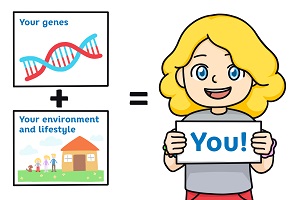Is ADHD inherited?
Summary
- Research tells us that ADHD may be inherited (a genetic contribution). This means it's more likely for a child to have ADHD if they have a close family member who also has ADHD.
- There are changes you can make to your child’s environment that will have a positive impact on their ADHD symptoms.

What are genes?
Genes are the building blocks for the cells in our body. We inherit genes from our parents (for example hair and eye colour etc). Just like hair and eye colour, children can also inherit genes that affect the way their brain develops.
Do genes contribute to ADHD?
The exact cause of ADHD is unknown. Research tells us that there is an increased chance that a child will have ADHD if they have a close relative with ADHD. However, other factors like being born prematurely or smoking in pregnancy can increase the risk of ADHD. This tells us that both genes and the environment may contribute to a child having ADHD.
The interaction between genes and the environment
Genes are important, however, a child’s attention, regulation and concentration skills are also affected by the environment, such as circumstances, people and events that happen around them.
This may include:
- their home and school life
- what they eat
- the amount and quality of their sleep
- the community activities they take part in
- the relationships with people around them.
Making changes to your child’s environment can have a positive effect on your child’s ADHD symptoms.
Explore the attention, regulation and concentration webpages for practical ways you can help your child.

